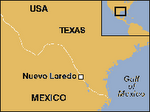In an exclusive interview of Sen. Joseph Biden by Frank Levine, published October 19, 2008, just prior to the November election, the vice-presidential candidate promised that the U.S. Constitution will once again protect the rights of all.
By Frank Levine
Roswell Daily Record
 |
"I will keep the government out of our lives, out of our homes, and off our telephones," said Biden, condemning the current level of governmental access to the private lives of millions of Americans. "I will restore our Fourth Amendment rights that have been either attacked or diluted during the Bush administration."
He said the restoration of Constitutional rights to Americans will not limit the country's effectiveness or collective resolve in fighting the current war on international terrorism.
As one of the longest and most bitterly contested presidential campaigns nears its end, Biden took a few minutes in a telephone interview Friday to focus on some of the issues that have been all but ignored in the day-to-day media coverage of the candidates.
There was just one light-hearted mention of "Joe the Plumber" during the interview.
Biden, who has been in the U.S. Senate since 1972, knows Washington well, and fully understands the ebb and flow of political power.
Top on his administration agenda, and also linked to the Constitution, would be to restore balance between the three branches of government, by dismantling the "unitary executive" theory promulgated by the current administration that has, according to Biden, severely limited congressional or judicial intervention in the exercise of near absolute presidential power.
"The current president uses it (unitary executive power) to tap your phone, hold secret hearings, hold people without trial indefinitely, and undermine the foundation of our laws through the elimination of habeas corpus," he said. "There are no restraints on that power, as it is currently applied."
Habeas corpus is the long-standing judicial principal that entitles a criminal defendant the right to demand the state "produce the body" of evidence that would justify a defendant's incarceration. Without it, a defendant must be freed.
Under the current administration, Biden said, defendants can be held indefinitely without charge and with no recourse, "simply on the president's say so."
Officially, the unitary executive theory relies on the so-called "Vesting Clause" in Article II of the Constitution that states, in part: "The executive power shall be vested in a President of the United States of America." The theory is more understood when the clause is considered in conjunction with the so-called "Take Care clause that gives the president the right to "take care that the laws be faithfully executed."
This interpretation, according to Biden and others, has strictly proscribed the powers of the Congress and Judicial branches of government in recent years, giving the president powers heretofore unseen - with a few exceptions during time of war that were later nullified by judicial or executive review.
Biden, who is on a whirlwind campaign tour of New Mexico, also visited Mesilla, Friday, where he reportedly warned supporters that the presidential campaign is likely to get ugly in its final days prior to the Nov. 4 election.
During his wide-ranging interview with the Daily Record, Biden focused on the bread and butter issues of the Obama campaign, including health care, clean energy and the war in Iraq.
He said that new ways must be found to diminish our country's dependence on foreign oil, especially when the United States produces only 4 percent of the world's oil production, yet consumes 25 percent.
"Of course we must still drill for oil," he said, "but we must also seek a rational energy policy that develops alternative sources of energy."
He said that a major investment, of up to $15 billion "up front" is initially required to explore and develop alternatives.
Earlier, Biden told a massive crowd in Mesilla, "We are going to reclaim our place in the world. We will end this war in Iraq. We will end it responsibly."
Biden was born in Scranton, Pa., and lived there for 10 years prior to moving to Delaware. He was first elected to the Senate in 1972, and became the fifth-youngest senator in U.S. history. He was re-elected to the Senate five more times. He is current chairman of the Senate Foreign Relations Committee.
"I know what is planned as to the draw down of forces in Iraq," he said. "The plan mirrors almost exactly what Barack has been saying from the beginning."






